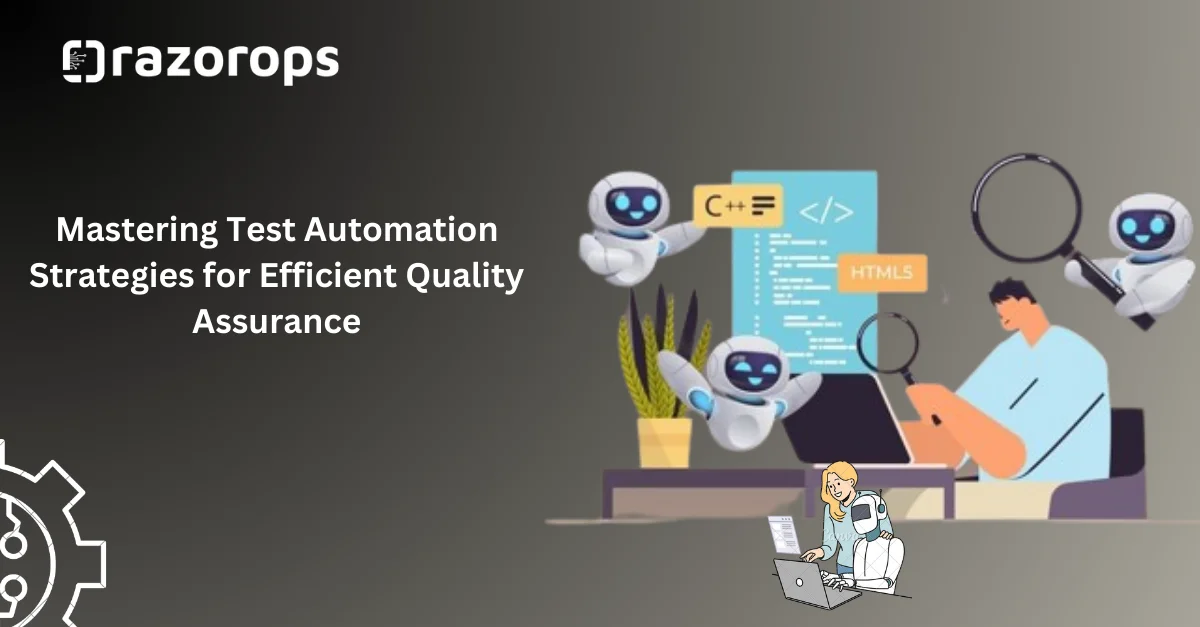Mastering Test Automation Strategies for Efficient Quality Assurance

Software development landscape, mastering test automation has become crucial for ensuring efficient quality assurance (QA) processes. Test automation not only accelerates testing cycles but also enhances test coverage and accuracy, leading to higher-quality software releases. This blog explores key strategies for mastering test automation and achieving efficient QA outcomes.
Understanding Test Automation:
Firstly, it’s essential to understand what test automation entails. Test automation involves using specialized tools and scripts to automate the execution of test cases, eliminating manual effort and improving testing efficiency. It covers various types of testing, including functional testing, regression testing, performance testing, and more.
Setting Clear Objectives:
Before diving into test automation, it’s important to establish clear objectives. Define what aspects of QA you want to automate, such as smoke testing, regression testing, or integration testing. Set measurable goals, such as reducing testing time, increasing test coverage, or improving defect detection rates.

Selecting the Right Tools:
Choosing the right test automation tools is critical for success. Evaluate tools based on factors like compatibility with your technology stack, ease of use, robustness, and community support. Popular test automation tools include Selenium for web application testing, Appium for mobile testing, and JMeter for performance testing.
Designing Robust Test Cases:
Create robust and reusable test cases that cover various scenarios and edge cases. Use techniques like data-driven testing, parameterization, and modularization to enhance test case efficiency and maintainability. Well-designed test cases lead to more reliable test results and easier test maintenance.
Implementing Continuous Integration:
Integrate test automation into your CI/CD pipeline to achieve continuous testing. Automate test execution triggered by code changes, ensuring early detection of defects and faster feedback loops. Continuous integration enhances collaboration between development and QA teams, promoting a culture of quality throughout the development lifecycle.
Leveraging Test Data Management:
Effective test data management is crucial for successful test automation. Ensure that test data is realistic, diverse, and representative of production scenarios. Use data masking and anonymization techniques to protect sensitive data during testing. Implement data-driven testing approaches to validate application behavior across various data inputs.
Monitoring and Reporting:
Implement robust monitoring and reporting mechanisms for test automation. Monitor test execution results, identify failures, and investigate root causes promptly. Generate comprehensive test reports with actionable insights, highlighting areas for improvement and tracking QA metrics like test coverage, pass rates, and defect density.
Continuous Learning and Optimization:
Test automation is an ongoing journey of learning and optimization. Regularly review and optimize automated test suites to remove redundancies, improve test coverage, and enhance test efficiency. Stay updated with industry best practices, emerging technologies, and new automation tools to continuously enhance your test automation strategy.
Mastering test automation is not just about implementing tools and frameworks but also about adopting a strategic approach to quality assurance. By understanding the importance of automation, choosing the right tools and frameworks, creating a robust strategy, integrating automation into CI/CD pipelines, monitoring results, and fostering continuous learning, teams can achieve efficient and effective quality assurance processes in their software development lifecycle. Follow RazorOps Linkedin Page Razorops, Inc.
Enjoyed this article? Share it.







